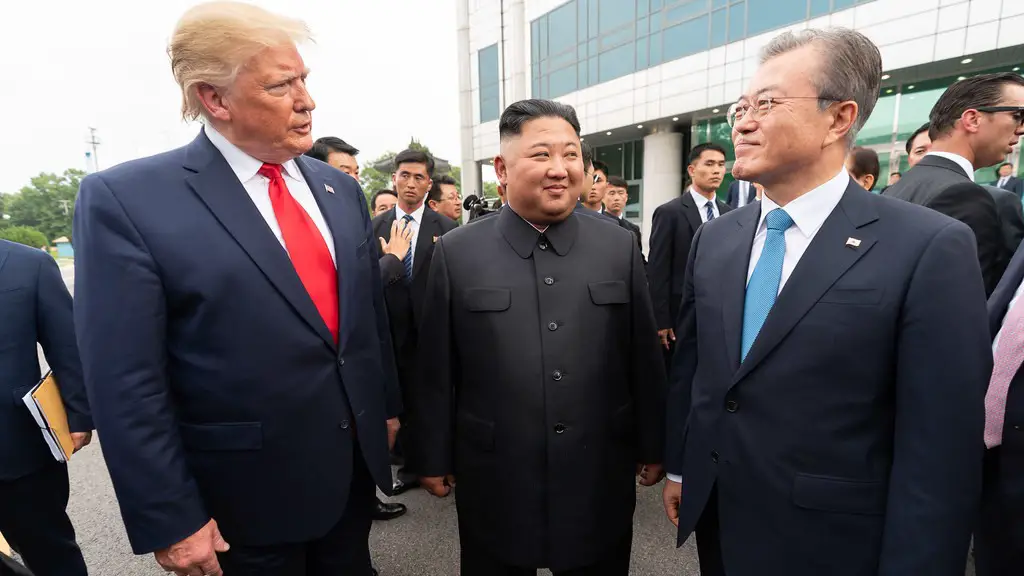Risks and Challenges
As a global geopolitical player with a long history of protecting its own interests, China knows there are risks to attacking North Korea. Such a move could damage Chinese credibility, spark a trade war with China’s neighbors in the region, and provoke a response from North Korea and its allies. Even if China were to “win,” there’s no easy way to carry out the occupation, damage control, and rebuilding of North Korea after the war. The potential implications of a conflict are dire, and China knows it is better off avoiding a fight at all costs.
China’s attitude toward North Korea is complex and multifaceted, but one thing is certain: China does not want to see a war on its doorstep. As one of North Korea’s most important allies, China has leverage over the reclusive nation and has used this leverage to impose punitive economic sanctions on North Korea. This demonstrates China’s commitment to keeping the peace, and its preference for diplomacy over violence.
From the perspective of international relations, China is aware that a war with North Korea could have serious repercussions for its reputation and relations with other countries in the region. Political analyst James Abrahamson argues that “China does not want to be seen as the aggressor in an international conflict, as that could damage its standing in the eyes of its neighbors, especially in a region where Beijing enjoys strong support.”
The risk of a confrontation with North Korea is dangerous, and China is aware of this. As Chinese Foreign Ministry spokesman Geng Shuang said in a statement, “China will never allow any country to use force or threat to use force against China’s sovereignty.” China is also aware that any attack on North Korea could potentially trigger a larger regional conflict, involving the United States and other regional powers.
Benefits of Avoiding Conflict
For Chinese policy makers, the benefits of maintaining the status quo, rather than risking a war, are clear. Maintaining diplomatic relations with North Korea means that China can continue to use its leverage to pressure North Korea to denuclearize and restrain its military ambitions. Furthermore, maintaining the peace on the Korean Peninsula also means that China can focus on its own economic goals, without worrying about potential interruptions to trade and other activities.
By avoiding conflict, China stands to benefit both economically and diplomatically. Its involvement in the denuclearization negotiations has given it a leading role in the international community, and its overtures to North Korea have cast it in a positive light in the eyes of many in the region and beyond. Furthermore, any economic activity between the two countries will benefit both sides, as well as the wider global economy.
Impact of Sanctions on North Korea
Despite its desire to avoid conflict, China is still willing to put pressure on North Korea to abide by its obligations to denuclearize. In September 2017, China joined the international community in imposing harsh economic sanctions on North Korea, targeting its vital exports, such as coal and other mineral resources.
These sanctions have had a significant impact on North Korea’s economy, with the country experiencing a sharp decline in its gross domestic product in 2017. Furthermore, the United Nations estimates that the sanctions have cut off up to 90 percent of the North Korean’s country’s export revenue, putting an immense strain on the fragile North Korean economy.
While these sanctions have had some undeniable impacts on North Korea, they have come at a cost to China as well. The sanctions have disrupted trade flows, causing financial losses to Chinese investors, businesses and exporters, particularly those involved in sending goods to North Korea. These sanctions are part of the “cost” of diplomacy for China, and the country is well aware that their effectiveness relies on all parties involved—including China itself—working together to enforce them.
Experts’ Opinion
Charles Armstrong, professor of Korean studies at Columbia University, echoes the sentiment that Chinese policy makers are taking a pragmatic approach to the North Korean situation. He says, “It is clear that they do not want a conflict on their doorstep, but they also view a nuclear North Korea as a threat to their region. China is working to prevent an escalation of the situation, and is looking for a diplomatic solution.”
China’s cautious approach is being echoed by other experts as well. According to military strategist Dr. Emily Postec, “China has expressed concern about a conflict in the region, and is trying to use its economic leverage to bring about a peaceful resolution to the crisis.”
Both experts agree that China wants to avoid a war with North Korea, but are aware of the potential risks and challenges associated with such an action.
US Role in Conflict
Arguably the most significant factor in the potential conflict between North Korea and China is the role of the United States. Since the end of the Korean War, the US has maintained a significant military presence in South Korea, and is now increasingly involved in a diplomatic effort to denuclearize North Korea. China’s relationship with the US plays a large part in its attitude towards North Korea.
China and the US have had a long history of disagreements and disputes, so it is no surprise that China is reluctant to take any action that could provoke the US and potentially create an even larger conflict in the region. As one expert states, “China is aware that they cannot risk a confrontation with the US. Any move on their part to attack North Korea could easily escalate into an international incident with global implications.”
China’s Overall Objection
It is clear that China does not support a full-scale conflict with North Korea. The risk of an all-out war, along with the possible economic and diplomatic repercussions, means that the Chinese government has no interest in engaging in a war with North Korea.
Instead, China’s overall aim is to use diplomatic pressure, economic sanctions, and other means to bring about a peaceful resolution to the conflict. To this end, China continues to engage in dialogue and negotiations with North Korea and the international community.
It is also encouraging to see that the Chinese government is taking a more active role in the global effort to denuclearize North Korea and ensure peace in the Korean Peninsula. China’s steady and rational approach to this complex and potentially explosive situation is an example of the potential of diplomatic solutions in difficult the global crises.
Achievements in North Korean Border Areas
Concerns over the security of the North Korean border have been alleviated recently, with China and North Korea undertaking joint measures to strengthen the peaceful environment. The two countries have begun to jointly patrol the borders and have opened a new Landports of Entry and Exit.
China has also lauded North Korea for its willingness to keep the peace on the Korean peninsula. Experts have noted that the two neighbors have managed to maintain peace despite the strained relations between their respective governments.
This recent rapprochement between China and North Korea has led to some economic activity and increased investment from Chinese companies in North Korean border areas. The results of this economic activity have been positive, with the region seeing an increase in tourists and greater economic stability.
International Pressure to Denuclearize
One of the key factors driving China’s policy on North Korea is its desire to support the international community’s push for denuclearization. China is an active participant in the Six-Party Talks, and has consistently supported a diplomatic solution to the North Korean crisis.
In addition, China has implemented the United Nations’ sanctions against North Korea, and is pushing for more dialogue on the issue. Despite its obvious reluctance to become involved in a conflict with its neighbor, China is standing with the international community and is doing what it can to ensure that a nuclear-armed North Korea does not become a long-term reality.
China-North Korea Relationship Moving Forward
In light of the recent efforts by the international community to denuclearize North Korea, it is clear that China views peace on the Korean peninsula as its ultimate goal. China continues to voice its objection to a war between North Korea and its neighbors, and is actively pursuing a diplomatic solution to the current crisis.
At the same time, China is confident in its ability to protect its own interests and attempt to influence the actions of North Korea without resorting to outright aggression. China is well aware of the potential consequences of attacking North Korea, and is instead focused on finding a peaceful solution.
Despite the obvious differences between the two countries, China has also sought to improve its relationship with North Korea. The two countries have made progress in terms of economic integration and have opened up new Landports of Entry and Exit to facilitate trade.
There are still many obstacles to overcome before the situation in the Korean Peninsula can be resolved, but for now, it would appear that China is doing what it can to minimize the risk of war and focus on finding a peaceful resolution to the crisis.


